Managing employees has never been easier thanks to modern Employee Management Tools. These online tools assist organizations on both large and small scales to manage their employees in a better manner. Whether you run a small startup or a large company, Management Tools can make your life much simpler.
In this fast-paced business environment, it is sometimes too cumbersome to monitor the workers’ schedules, activities, and performance. This is where Employee Tools come to the rescue. They assist you in keeping all things in a single location, hence it is easy to oversee your team without any anxiety.
Employee management software is a computer program that is meant to enable employers to manage their workers better. They contain such features as time tracking, scheduling, communication, and so on. They are time-saving tools that minimize any mistakes and make the working environment happier for all. The best part about Management Tools is that they work on computers, phones, and tablets. This implies that you will be able to manage your team anywhere at any time. These tools can also ensure that your employees are able to monitor their schedule, make requests, and keep in touch with the rest of the team.
Why Use Employee Management Tools?
- Save Time Daily: Employee Management Tools automate many tasks that used to take hours, like creating schedules and tracking work hours.
- Reduce Human Errors: Employee Management Tools remove errors in payroll, planning, and record keeping that are likely to occur in manual processes.
- Improve Team Communication: Employee Management Tools provide instant messaging and update features to keep everyone connected and informed.
- Make Employees happier: Employees love to be able to access their schedules, their time off requests, and company information in user-friendly applications.
- Better Business Decisions: These instruments present reports and information that aid the managers in making wiser decisions regarding their employees and operations.
Key Features of Employee Management Tools
- Time Clock Function: Employee Management Tools make it easy for employees to clock in and out through their phones with GPS monitoring to avoid cases of inaccurate time recording.
- Smart Scheduling System: Managers are able to make work schedules quickly, and it takes into account employee availability and business requirements automatically.
- Task Assignment Tools: Employee Management Tools allocate certain tasks to a team with due dates, instructions, and tracking of progress all under one roof.
- Communication Features: In-built chat, announcements, and updates of the company keep everyone up to date with the company up to date on vital news.
- Document Storage: Employee Management Tools keep files of employees of the store, training materials, and company policies safe and stored in a single digital location.
Top 10 Employee Management Tools in 2025
1. Connecteam
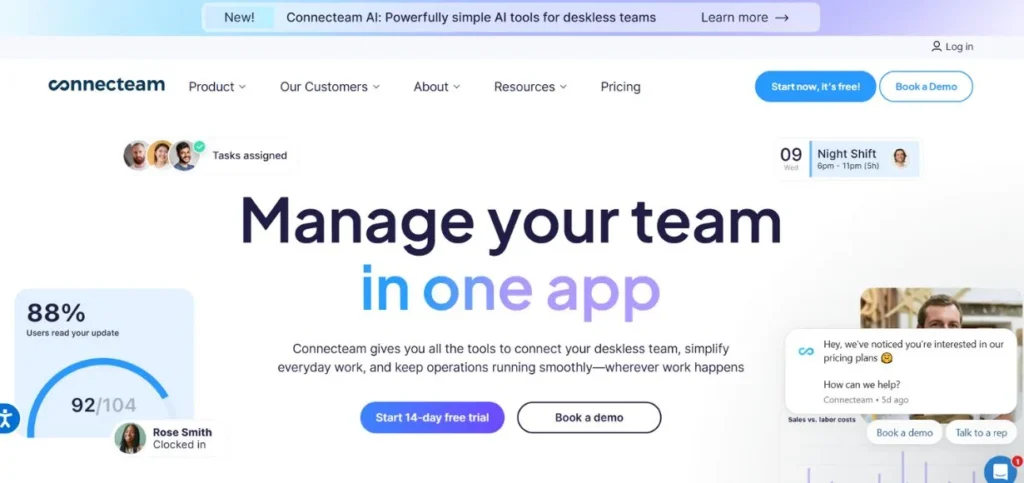
Connecteam stands out as one of the most popular Employee Tools for businesses with field workers and non-desk employees. This is a one-stop-shop solution that includes communication and scheduling, time tracking, and HR management in one simple-to-use application. What is unique about Connecteam is that it is designed in a mobile-first way, and thus is suitable for all groups that do not work in regular offices.
Employee Management Tools provide three primary hubs, namely, Communications, Operations, and HR and Skills, to enable businesses to select only the features that they require.
Key Features
- GPS time tracking system
- Auto-scheduling develops the best schedules.
- In-app chat and updates
Pros
- Very easy to use
- Great customer support team
- Lower pricing schemes are on offer.
Cons
- Always needs internet.
- Poor desktop functions.
- Certain advanced features are additional.
Best For: Field teams
Pricing: Starts at $ 29 /mo
Website: https://connecteam.com/
2. Zoho Workplace
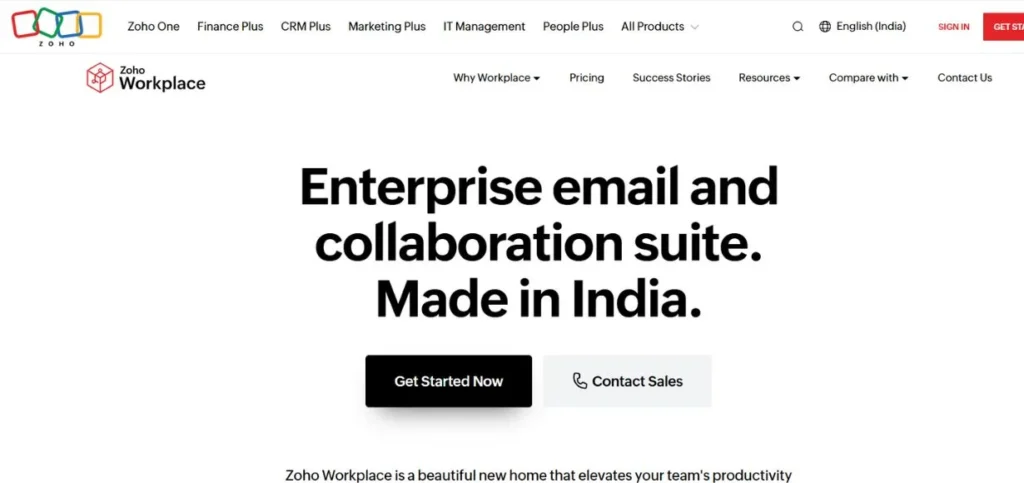
Zoho Workplace offers a comprehensive suite of Management Tools that work great for businesses focused on employee engagement and collaboration. The platform has Zoho people who deal with HR management, time tracking, and employee development. The difference with Zoho is that it is highly focused on keeping its employees engaged by means of surveys, recognition programs, and surveys.
Employee Management Tools have good integration with other business applications and offer in-depth analytics to enable managers to gain knowledge of their workforce.
Key Features
- Employee polls and surveys.
- Extra time monitoring scheme.
- Development training modules.
Pros
- Excellent mobile app access
- Good customer service.
- Features at reasonable prices.
Cons
- It may be complex at first.
- Some users report bugs.
- Installation consumes a lot of time.
Best For: Engagement
Pricing: Starts at ₹99₹99/user/month billed annually
Website: https://www.zoho.com/en-in/workplace/
3. 15Five

15Five focuses specifically on performance management and employee feedback, making it one of the specialized Employee Management Tools in the market. The application enables managers to keep in touch with their employees by checking in with them regularly, reviewing performance, and tracking goals, establishing a culture of openness and constant improvement.
Employee Management Tools offer extensive reporting and analytics useful in determining the trend of employee performance and satisfaction.
Key Features
- Check in system of employees once a week.
- Feedback and performance review.
- Goal tracking and analytics
Pros
- Increases staff involvement enormously.
- Convenience via mobile.
- Performance analytics are also available in detail.
Cons
- No core HR features
- Goal-setting may perplex.
- Low ability to schedule.
Best For: Performance
Pricing: Starts at $4 per user per month
Website: https://www.15five.com/
4. Gusto
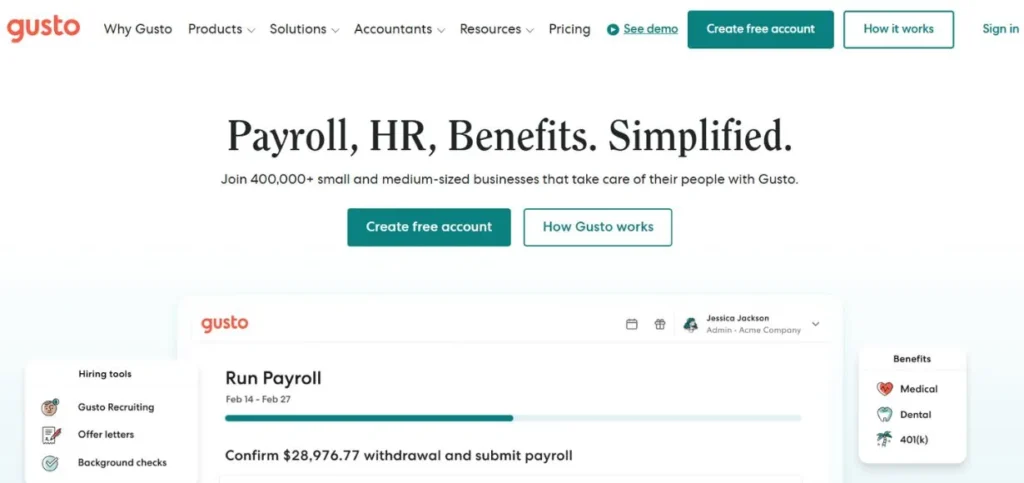
Gusto serves as one of the premier Management Tools specifically designed for payroll and benefits administration. This platform streamlines complex payroll operations, ensuring accuracy and automating tax calculations, direct deposits, and compliance requirements. In addition to payroll, Gusto provides HR tools, employee onboarding, and benefits management under a single roof. The system has been especially popular amongst the small and medium-sized businesses since they do not require a large number of suppliers.
Key Features
- The pay processing system is computerized.
- Benefits administration and management.
- Onboarding and documentation of the employees.
Pros
- Good quality payroll accuracy rates.
- Design of user user-friendly interface.
- Great customer support team
Cons
- Premium price as compared to rivals.
- Restricted options for international payroll.
- Some features need upgrades
Best For: Payroll
Pricing: Starts at $19.60/mo
Website: http://gusto.com
Suggested Blog to Read: recruiting automation software
5. Sling
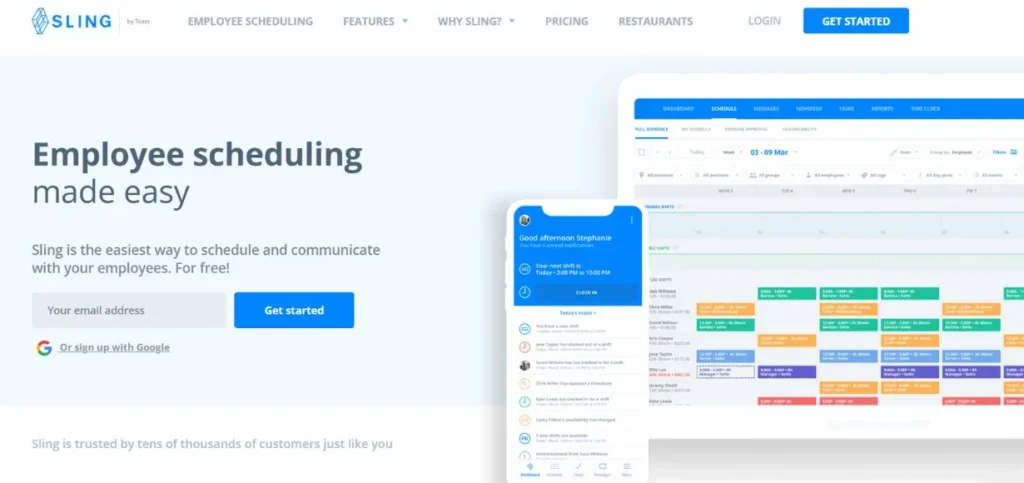
Sling specializes in employee scheduling and time management, making it one of the most focused Employee Management Tools available. It assists managers in drawing schedules in a short time, taking into account the availability of employees, the labor expenses, and business requirements. Sling has aspects of scheduling, such as time-offs, time-off requests, and tracking labor costs.
The system sends automatic messages to employees regarding any change in schedules and oncoming shifts. Sling offers a clean interface and mobile apps that make it easy for managers and employees alike to be organized and well-informed about work schedules.
Key Features
- State-of-the-art scheduling and shift management.
- Labor cost tracking tools
- Switching among workers.
Pros
- Great scheduling facilities were available.
- Mobile app works great
- The free plan is available at present.
Cons
- Limited HR features overall
- Simple reporting capabilities only.
- Customer support should be better.
Best For: Scheduling
Pricing: Request Pricing
Website: https://getsling.com/pricing/
6. Deputy
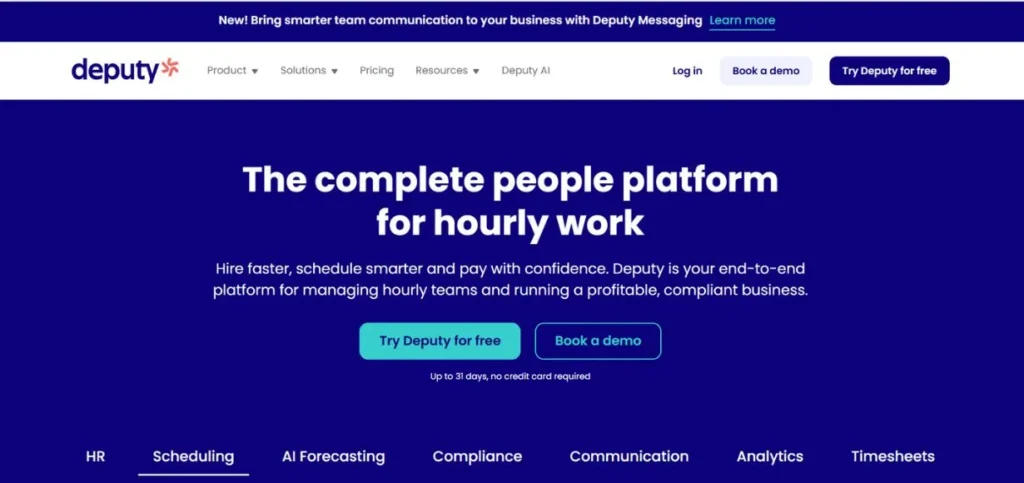
Deputy focuses on time tracking and workforce management, positioning itself as one of the reliable Management Tools for businesses that need accurate time records. The portal also has more advanced time tracking features, and they include GPS location verification, break tracking, and overtime calculations.
Deputy also fits in with most popular payroll systems, and processing correct payroll on the basis of recorded hours is straightforward. The system also has planned functions, task control, and communication features with employees.
Key Features
- A time tracking system that is GPS-enabled.
- Payroll integration.
- Break and overtime calculation.
Pros
- Proper time tracking is given.
- Integrations of good payroll systems.
- Quality mobile application.
Cons
- Premium prices as compared to the competitors.
- Poor HR functionality.
- It takes a complicated installation procedure.
- A complex setup process is required
Best For: Tracking
Pricing: Starts at $5 per user per month
Website: http://deputy.com
7. Workday

Workday is an enterprise-level Employee Management Tool that is targeted at large organizations with complicated HR requirements. The platform has a full-scale human capital management system and includes talent procurement, performance management, payroll, and analytics. The advantage of Workday is its robust reporting features and the possibility of working with more complicated organizational setups.
The artificial intelligence technology of the system is used to give information regarding the trends in the workforce and to aid in planning. Although Workday is highly functional, it is very expensive and time-consuming to implement, which is why it is best used in large organizations with highly staffed HR departments.
Key Features
- HR management system at the enterprise level.
- Powerful analytics and reporting.
- Machine-learned insights.
Pros
- Full feature list enabled.
- Well-suited to big organizations.
- Powerful reporting and analytics.
Cons
- The price model is very expensive.
- It takes a complicated implementation process.
- Steep learning curve
Best For: Enterprise
Pricing: Contact for pricing
Website: http://workday.com
8. Jobber
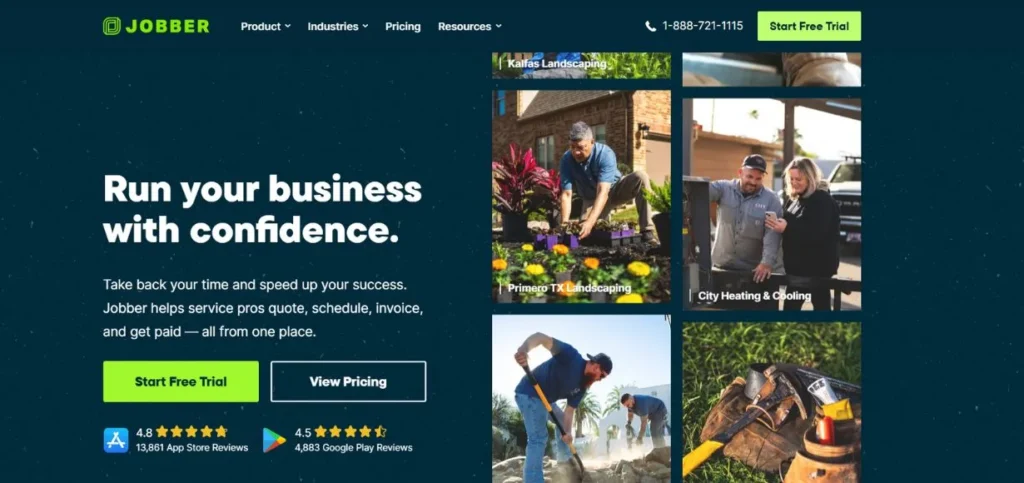
Jobber targets field service businesses, making it one of the specialized Employee Management Tools for companies that provide on-site services. The platform integrates scheduling, dispatching, invoicing, and customer management within a single solution.
Jobber also assists service companies in coordinating their workforce in the field and keeping customers up to date with the appointments and other service details. The system consists of GPS tracking, time tracking, and mobile forms to be filled out by technicians on-site.
Key Features
- Field service management system.
- Communication with customers and planning.
- Mobile forms and invoicing
Pros
- Excellent in the service business.
- Superior customer management characteristics.
- Mobile-friendly field functions.
Cons
- Service industries only.
- Higher cost per user
- Basic HR features only
Best For: Services
Pricing: Starts at $149/mo Billed annually
Website: http://getjobber.com
9. Homebase
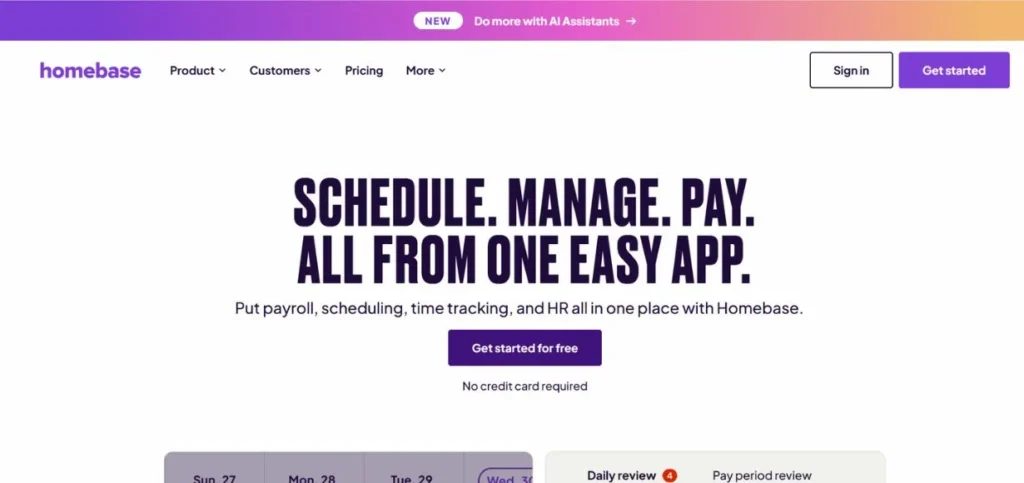
Homebase targets small businesses, especially through the retail and hospitality industry, and provides Employee Tools, which are user-friendly and inexpensive. The platform comprises time tracking, scheduling, and communication features among teams and simplified HR functionality.
Homebase stands out because of its free plan for 20 employees and is affordable to any extremely small business. The system helps in preventing a few of the typical scheduling errors, including a double-booking error and overtime violation. Homebase also has features for hiring and onboarding employees.
Key Features
- Free plan for small teams
- Timetable of conflict prevention.
- Basic hiring and onboarding
Pros
- Free version currently in use.
- Simple and easy interface
- Good for small businesses
Cons
- It has some advanced features.
- Basic reporting only.
- A minor number of integrations compared to competitors.
Best For: Small businesses
Pricing: Starts at $30/month
Website: http://joinhomebase.com
10. ProofHub
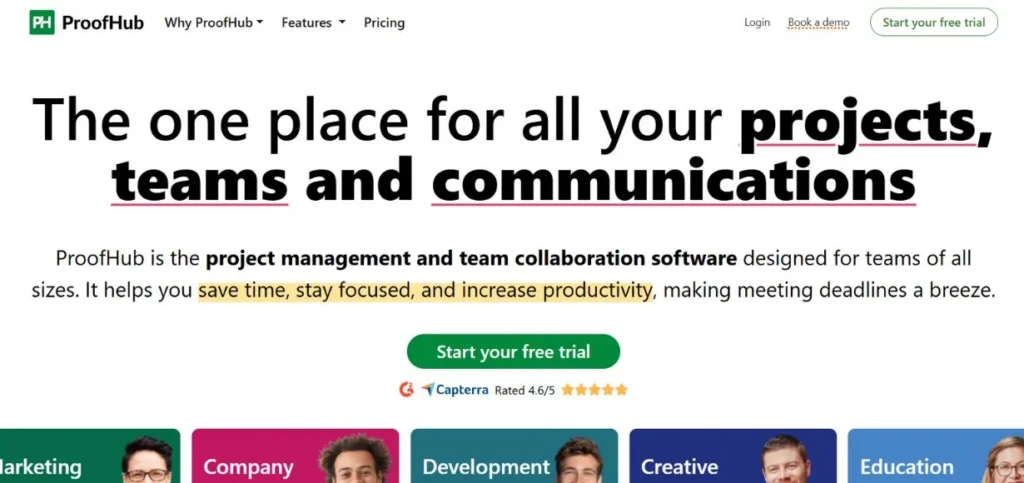
The ProofHub system is a blend of the project manager and the Management Tools, thus it is suitable for teams that handle more than one project at a time. The platform includes some features of task management, time tracking, collaborative teamwork, and project planning.
Proofhub is employed to allow managers to assign and oversee their work and make sure that they arrive on time. The creative departments have inbuilt chat, file share, and proofing devices in the system. ProofHub is not a customary Management tool; however, it is a very effective tool to make teams stay organized and productive.
Key Features
- Project and task management
- Team collaboration and chat
- Time tracking for projects
Pros
- Great for project-based work
- Cooperation features are good.
- Good value for money
Cons
- Not focused on HR
- Lack of proper handling of workers.
- Simple scheduling only.
Best For: Projects
Pricing: Starts at $89/month
Website: http://proofhub.com
How to Choose the Right Employee Management Tool for Your Business
- Consider Your Team Size: Small teams need simple Employee Management Tools, while large companies require more advanced features and user management capabilities
- Name Must-have Features: List must-have features like time tracking software, scheduling, or HR management tools before comparing different options available
- Check Your Budget: Compare pricing plans, calculate the total cost, which includes the set-up price, the monthly charge, and the cost of extra features.
- Think About Growth: Choose the tools that will be capable of scaling with your business, and allow the number of users or features to be increased as your company expands over time.
Common Mistakes to Avoid When Using Employee Management Tools
- Skipping Employee Training: Failure to educate your staff on the proper use of the new Employee Tools will cause confusion and low adoption rates.
- Choosing Too Many Features: Selecting complex systems that do not match your needs complicates the tools and increases their cost beyond what they should be.
- Not Checking Integrations: Discovering whether the tools are compatible with your current payroll, accounting or other business systems or not is an additional strain in the future.
- Forgetting Data Security: Failing to conduct a review of the security features and compliance standards of the Employee Tools exposes sensitive information of employees.
Conclusion
Employee Management Tools have become essential for modern businesses that want to stay competitive and efficient. These are the potent solutions that assist companies to work with their staff better, to save time, and to minimize errors. Whether they are small startups or big businesses, Employee Tools have something that will be of value to any kind of business. The key to success with Employee Tools is choosing the right solution for your specific needs.
Employee Tools will keep on improving as we proceed in 2025. The tools are becoming even more powerful with new features, such as artificial intelligence and sophisticated analytics. Companies that embrace these technologies in the management of the most valuable asset- their people have a bright future.
FAQs
Q1: What are Employee Management Tools, and why do I need them?
Employee Management Tools are software applications that help businesses manage their workforce more efficiently. You need them because they will save time on the administrative side, minimize mistakes in scheduling and payroll, enhance communication among the team members, and give you valuable insights on your workforce due to detailed reporting and analytics.
Q2: How much do Employee Management Tools typically cost?
The cost of Employee Tools varies widely depending on features and company size. Simple plans may start at a customary of 2-4 per user per month, and complex solutions can be as costly as 29-50 a month for small groups. Free plans are available to very small businesses by many providers, and enterprise solutions have to be priced according to specific requirements.
Q3: Can Employee Management Tools work for remote teams?
Yes, most modern Employee Tools are designed to work perfectly with remote teams. They provide mobile apps, Web-based access, GPS timekeeping, virtual communication, and online collaboration tools that can unite distributed teams and make them productive irrespective of the geographical placement.
Q4: How long does it take to implement Employee Management Tools?
The time of implementation differs with the level of difficulty of the selected solution and the size of the company. Simple tools like basic scheduling apps can be set up in a few hours, while comprehensive Employee Management Tools may take several weeks for full implementation, including data migration, employee training, and system integration with existing business processes.
